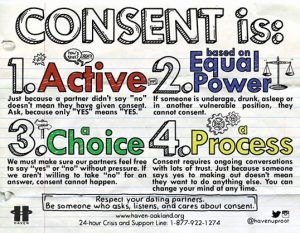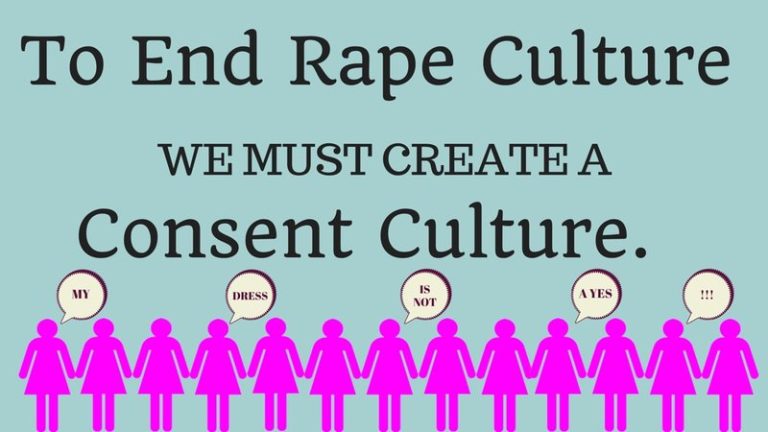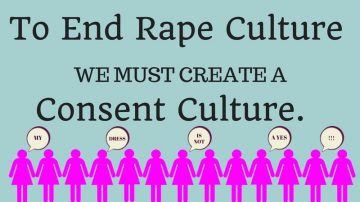
A woman raised her hand in Relief Society class. Prefacing her comment with, “I have never done this, but I have a friend who…,” she went on to tell us about a mother of teenage sons who had a “Modesty Closet.” If one of her sons’ dates was dressed in spaghetti straps or something else they felt was too revealing, they would make her choose a sweater from the Modesty Closet to cover herself up before continuing the date. The commenter finished her story by asking, “What do you think of that?”
There were audible gasps of horror from the women in the classroom during the Modesty Closet account followed by awkward silence. I wanted to say something but I had no words. Fortunately, someone else, another mother of teenage sons, eventually broke the silence and explained that boys should be taught to exercise self-control and to take responsibility for their own thoughts and actions, regardless of what a girl is wearing.
I was relieved, but there was something more about this scenario that bothered me. Something else I didn’t have a word to describe.
That word is consent.

Consent is often absent from Mormon discussions. Because we teach sexual abstinence before marriage, some assume that the concept of consent is not relevant; singles will not be having sex, so they don’t need to learn how to obtain consent before sexual acts. Besides the obvious rebuttal that both rape and consensual, premarital sex actually do occur in Mormon communities, I would like to propose another reason that we should teach consent: consent applies to platonic relationships as well as sexual ones.
The woman with the Modesty Closet was teaching her sons that while on dates, they had the right to dictate the behavior of the girls they dated—in this case, by demanding that they cover their shoulders. Because men are more likely to plan and pay for dates in our culture, some feel that men have a right to control the date to a certain extent and some women feel obligated to go along with their dates’ wishes. This pattern can have relatively harmless results—such as a woman watching a man’s preferred movie instead of the one she would prefer—but it can also lead to more serious situations including date rape.
Suggestions for Teaching Consent in the Mormon Context
Teach Mormons that they must respect the autonomy of those they date, even in dating situations that fall within the accepted boundaries of Mormon chastity guidelines. No one has the right to exert control over the personal choices of people they date, such as their wardrobe. Accepting a date does not obligate a person to provide any kind of intimacy, even acts allowed by church standards such as kissing. “No” and “Stop” must be honored, and not only with regards to sexual intimacy. People have the right to decline date requests, to stop unwanted romantic advances and to end dates early if they so choose.

Teach Mormons that sex without consent is rape. As a Mormon teen, I often heard the message, “Don’t consent to sex.” This message is clearly laid out in our church curriculum. I also heard the message, “If someone performs a sexual act with you without your consent, that is rape” but I came from a Mormon family that was educated about rape the hard way—one of my relatives was a predator. I don’t think I ever heard the message, “If you perform a sexual act with someone without that person’s consent, you are a rapist.” This vital message should not be left out.
As Mormon women have shared their stories about being raped during their time as students at BYU, it has become clear that not all Mormons are taught to recognize sex without consent as rape. Some victims of rape did not know to define what happened to them as rape. Some of the ecclesiastical leaders and school administrators they reported to did not appear to understand that nonconsensual sex with a victim’s boyfriend is actually rape.
Eliminate the myth that spontaneous sex is less sinful than premeditated sex. In comprehensive sex education programs, students learn how to navigate sexuality responsibly. In addition to asking for consent before sexual acts, they learn to communicate about the decision to have sex and to plan accordingly, using condoms and contraception to reduce the likelihood of disease transmission and pregnancy.

Mormons are taught that it is sinful to procreate outside the bonds of marriage. And yet, it seems that many Mormons believe that a sin “of passion” —in other words, losing control and having sex without any prior discussion and planning—is more forgivable than “premeditated” sin, even though planned sex with appropriate precautions taken is less likely to result in unwed pregnancy. Some Mormon ecclesiastical leaders may even invoke harsher disciplinary action to parishioners who planned for sex. A culture that discourages communication about sex between partners creates a barrier to consent.
In teachings and policy, differentiate between the severity of sexual sins. Careless statements implying that any sexual sin is “the sin next to murder” leave no room to differentiate between consensual premarital sex and the much more serious sin of rape. The revelation that BYU has been punishing rape victims for honor code violations, acknowledging and accepting the chilling effect on rape reporting, is a case study in misplaced priorities. Our policies need to prioritize identifying rapists and protecting people from being raped over identifying and punishing rule-breakers.
Here are some videos about rape at BYU for reference:
Elizabeth Smart Investigates Official Responses to Campus Sex Assaults – Pt. 1 – Crime Watch Daily
Elizabeth Smart Investigates Official Responses to Campus Sex Assaults – Pt. 2 – Crime Watch Daily







41 Responses
If the spaghetti strap attire of a young woman destined for a date with my son made my son uncomfortable, and I would hope it would, I believe a more appropriate response to the situation is for my son to have a conversation with the young lady, right then at her house, expressing his discomfort & why, & asking her to change.
If she doesn’t want to change, and it is her agency to make that choice, then they can choose not to go out together. A conversation & a request honors the agency of BOTH parties.
The Modesty Closet is totally a inappropriate response. If the attire is that bothersome, then a conversation needs to take place, not a forced cover-up. “They”, the young man’s mother & he, have not right to “make her choose” a sweater. A young woman who has accepted a date with her son does not forfeit her agency, & certainly not to a not yet mother-in-law. I did not wear spaghetti straps, as my Presbyterian mother thought they were sinful, but had a date pulled this type of nonsense on me, I would have informed both he & his mother that a sweater would not be needed for the ride back to my house, as the date was over.
And why exactly would spaghetti straps make a boy uncomfortable unless he has been raised his whole life being told they should make him uncomfortable? There is nothing sexual about shoulders. We aren’t even taking about cleavage here. She’s not topless or naked. We are taking about shoulders. I understand your desire for your son to be comfortable on dates but the reason bare shoulders make him “uncomfortable” is because he’s been raised to associate that with “immodesty” and lack of purity. If he doesn’t want to date a girl who shows her shoulders he should only ask girls out with the same strict religious beliefs as he has and leave the rest of the poor girls alone. The last thing a teenaged girl needs when showing up for a date is a patronizing lecture on modesty from a peer.
As parents in the LDS Church, we are (or should be) trying to prepare our children to go to the temple and make the higher covenants there. Part of that is wearing the garment. If a person needs to change their whole wardrobe the day they receive their endowment, have they really been prepared for those sacred covenants? The issue of shoulders is not about sexual provocation, its about garment-friendly clothing. This is the message we should focus on when teaching about modesty, yet I hardly ever hear the connection made to temple garments on standards night or any other talks to the youth. Maybe there is reluctance since we are taught not to say “too much” about the temple. But the fact that the Church put out a video about temple garments an even showed the temple robes, I would say there should be no hesitation to make the temple garments the focus of our modesty discussions. We are preparing you to make the covenants including wearing the garment, so we teach you to wear clothing that is compatible with the covenants. Therefore, you show that you desire these blessings and that you are preparing yourself by they way you dress.
Ernest, perparing oneself for the temple seems like something that’s very much an individual decision and not something to be policed by another person. If somebody wants to prepare themselves that way, that’s great, but if they decide that particular part of preparation isn’t a priority for them, that’s not something to police for others. Again, it’s an issue of respecting another person’s bodily autonomy and ability to make decisions for themselves.
Liz, if the focus were more on preparing to wear the temple garments, there would naturally be less “shaming” that tends to go with many of the things that are heard in Young Women’s. Our friends who are Catholic and Protestant teach their kids the same modesty standards that we as Mormons have, but do so using rhetoric that is along the lines of “Don’t turn on the boys cause they can’t help themselves.” I see that as a “terrestrial” form of motivation. I think that teaching the Youth that their choice of clothing is part of their preparation for what they are expected to wear after they go through the temple as a more “celestial” form of teaching. I think it is wise that we are focused on the temple in everything we teach, rather than rely on the lesser motives that our friends who do not have the sacred covenants in their lives use.
One other thought Liz. On the subject of “policed by another person”, the standards taught in the “For the Strength of Youth” book are written under the direction of and approved by the First Presidency and the Twelve Apostles. So we ought to be teaching our kids that fact as well. If you are not following the council that they teach on dress standards, are they sustaining them? Since that is a part of the temple recommend interview questions, I disagree with your position that it is an individual matter if clothing standards is important or not to preparing to go to the temple.
Jen, spaghetti straps could make a young man uncomfortable when he has been raised in a home where his parents were married the the temple & wear their garments. My son was taught from an early age, as were my daughters, that they should not wear clothing that would not be compatible with wearing temple garments.
Since you were not in our home, to state that “the reason bare shoulders make him uncomfortable is because he has been raised to associate that with immodesty and lack of purity” is a stretch on your part. I am a convert to the church, baptized at age 18, & those were not the stated reasons in our home to cover shoulders. As a practical matter, he did date only LDS young ladies, but found a wide variety of understanding among them as to what constituted appropriate dress. He found that by discussing what he believed, & why, word travelled quickly within the dating communities where he was, & it was not hard to find young women to date who felt the same way as he did on a variety of topics. For the record, I have never suggested a patronizing lecture on modesty from a peer, or from an adult for that matter.
As far as there being “nothing sexual about shoulders”, I would say that depends entirely on the individual. I dated one young man in my teens who clearly was turned on by shoulders, & in conversing with girlfriends, was aware of several others. One of my male friends “truly appreciated knees”. In my mother’s time, he would have been referred to as a “knee man”. I know that because I thought it odd & discussed it with her. Not all men are into cleavage.
With all due respect, why on earth would you hope that bare female shoulders would make your son uncomfortable? Why did you teach him that he should be uncomfortable around a woman or girl who wears spaghetti straps? What did you tell him those bare shoulders signify? What danger did you teach him those shoulders pose to him?
Why? Is it a matter of practicality–“don’t buy clothes when you’re 14 that you’ll only have to toss out when you turn 19 and go on a mission”–or a matter of righteousness–“people can tell you faithfully you live the gospel by how well you dress to accommodate underwear you don’t currently own”–or something else? Say, maybe that bare female shoulders or exposed thighs are associated with immodesty and lack of purity?
Perhaps…. or perhaps the reasons stated in the home were a justification for the real reasons, which were a fetishization of certain body parts in unhealthy ways, so that bare female shoulders or exposed thighs were associated with immodesty and lack of purity.
magic moon, in order, 1) because he had been taught that shoulders should be covered as preparation for sacred covenants he would make with the Lord when he was older. 2) because all of our children were taught that we covered our shoulders ( and thighs) as preparation for sacred covenants they would make with the Lord when they were older. 3) or perhaps the REAL reason is what I have already stated, multiple times, but which you are unwilling to accept. You are free to think as you will, but so am I, & it would be nice if you would at least respect my right to teach my children what I believe, without labeling me as having unhealthy fetishes about various body parts. If you knew me, you would know that characterization is quite off the mark.
That doesn’t explain why you taught him to be uncomfortable–your word–around a girl who doesn’t cover her shoulders and thighs.
What do you and your family members wear when they exercise? Or swim?
fyi: just as you get to think of modesty the way you want, I get to think of you and the things you teach your children the way I want.
Ever hear the saying “What people think of you is none of your business”?
Your inability to understand things like consent and the rights of others to make their own assessments of your behavior are part and parcel of the same problem.
To sum up, Marivene, what I’m objecting to in your comments is this:
It doesn’t. It violates them. It’s an example of how effective instruction about consent is undermined.
Exactly
I am going to propose that the date might have a strapless or strapped prom dress that she paid a lot of money for. Do you ask her to cover her dress then? I will be teaching my son to be able to speak to women by looking in their faces, being friendly, and not stressing about what they are wearing.
Star, when I was raising my son, the formal dances were usually not the problem, because color, etc, was discussed in the process of getting corsages, etc, which made the subject of modest dress easy to cover. Girl’s choice dances were harder, but I think the young man also has a right to feel comfortable on the date, & to have his standards of modesty respected also. It isn’t a one-way street. To me, the price of the clothing is irrelevant. My son would have been wearing a tux to a formal, which is also expensive. The point is that the conversation is best had well before the date, Even if you “think” you are on the same page. My son is now an adult, married with a daughter. He has always been able to speak to women by looking in their faces, but he preferred to date those who chose to wear modest clothing, & I think it is helpful in dating to find someone who has the same definition of modest as you do.
My daughters always wore dresses with sleeves. Sometimes we paid extra to have them added to the dresses.
if your son is not mature and responsible enough to feel comfortable with a girl who shows up to a formal dance in a dress that leaves her shoulders bare, he is not old enough to date.
magic moon, you are entitled to your viewpoint, but you are not entitled to put down my son, or me, simply because our definition of modesty differs from yours. My son is both mature and responsible, as is his father. By your definition, neither would be old enough to date, but that is the point of the entire post, isn’t it. Consent matters, & both parties need to agree on their definitions. As I mentioned in my first comment, my Presbyterian mother considered exposing the shoulders sinful. That definition of modesty is not confined to LDS culture, but what is important is that BOTH participants in the date honor the agency of the other, rather than trying to control each other. Communication is key.
So, Marivene, I’m not entitled to put down your son, or you, simply because your definition of modesty differs from mine–but you’re entitled to put down a young woman–you get to call her immodest, which is, after all, a put-down–simply because her definition of modesty differs from yours?
I hope you realize that’s very, well, shall we say, “problematic.”
Consent involves what someone else gets to do with YOUR body–not what you get to do with your own body. Telling some girl she cannot wear what is considered appropriate attire for a dance because your son can’t control his thoughts and actions if her shoulders are bare is a violation of consent, not an example of its appropriate use.
Please understand: you, your son and your husband do not come out looking admirable in this story you have told. Far from it.
magic moon, if you look back, you will see I did not refer to spaghetti straps as immodest. The word I used was bothersome. I think it is clear that our ideas of what constitutes appropriate clothing differ. That’s ok. But when young people from different background & opinions prepare to go out on a date, I don’t believe that either of them have the right to put the other in an uncomfortable position. My son did not try to change the opinions of girls who wanted to wear strapless or strapped dresses to formal dances; he simply didn’t ask those girls out. After a couple of high school dances, those who wore sleeves & those who didn’t had pretty much aligned in the various camps. In one instance, a young woman in our ward who had quite a crush on my son asked him to a girls choice. He was not excited to accept, & had not yet done so. She knew he seldom went to the formal dances at school & she also knew why, from speaking with one of his sisters. Everyone in the school knew that this young woman did not choose to cover her shoulders with her choice in dresses. She pressured my daughter, about my son accepting her invitation, & our daughter came home to tell her brother that the girl had a bet with some of the other young women that she could make my son go to the dance with her in a dress he wouldn’t like. Our son chose not accept her invitation.
It had nothing to do with my son controlling his thoughts.
As far as whether or not you approve of our actions, I have reached the point where I feel sufficiently targeted for expressing my beliefs, only to have other motivations ascribed to them, repeatedly. It seems you do not want to understand my point of view, at all, so I will leave.
And precisely why would spaghetti straps be “bothersome”?
You also said, “if the spaghetti strap attire of a young woman destined for a date with my son made my son uncomfortable, and I would hope it would”
Why would you hope that? Why would you hope your son would be uncomfortable around people who are dressed in what is widely considered appropriate attire?
Your son would be uncomfortable in such a position because you taught him to be uncomfortable.
Again, I really doubt that based on what you’ve conveyed. You taught him to be uncomfortable. His thoughts would probably be something like, “I can’t carry on a conversation with this girl, because she’s not dressed properly. My parents said so. I can’t talk to her, or enjoy her company, because those shoulders show that she doesn’t dress properly. She doesn’t meet my standards. I get to assess her behavior–that’s totally my right–but luckily my mom tells people on the internet that they don’t get to assess ours, so I’m set.”
I really like this, April. I love how many threads you’ve drawn together here. Just to pull one out and expand on it, I wonder if the frequent observation that Mormons are bad at boundaries couldn’t also be framed as a failure to teach consent issue. Your bishop may not feel the need to notify you that he’s going to interview your teen because he thinks your consent is irrelevant (related again to the boundary issue: a Church leader, or member for that matter, can pry into any and all aspects of your life). So the take-home message from that would be that consent is important in lots of situations, even non-romantic ones, which is I guess is kind of a generalization from one of your points.
I agree with this. The church tries to teach boundaries but fails to teach by example. The example by Ziff is particularly important. The bishopric should ask the parents for permission before interviewing their child… especially if the interview is one on one. The Bishop should also respect the parents request to be present for any interviews. It has only occurred to me, after becoming an adult, how uncomfortable I would be with a church leader conducting an interview and asking my child questions about their personal morality and sexuality without a parent there as well. When I was a kid, I never questioned that my parents weren’t there but I was also not comfortable with the lines of questioning. I had no clue what some of the questions meant and when I asked, got definitions that made me squirm inside.
The church should also recognize that if someone chooses not to answer a question, it doesn’t mean they are in sin, it could just mean that the person is uncomfortable talking about such things and to force them to talk about it is also a violation of consent. The church is too heavy on blind obedience and this is gross neglect in properly preparing the youth in how to handle many other types of relationships out there.
Yes, I have written about informed consent in bishop’s interviews, including parental permission and the right to refuse to answer questions, here: https://exponentii.org/introducing-informed-consent-to-bishops-interviews/
And coincidentally, my friend Mark also posted about consent today, and how it applies to a variety of situations at church: http://ordainwomen.org/yes-means-yes-how-indoctrinating-women-undermines-consent/
A modesty closet!?!? I would hope as a teen that if I was presented with something like that I would’ve ended the date, right there and then: No, I like the way I’m dressed, and if you have a problem with it I’ll use your phone and come call my parents to pick me up, thank you very much. (No mobiles back in the dark ages of the 1990s.) But then I think everyone in the bloggersphere knows how I feel about covering-shoulders-equates-to-modesty (who is this General Authority with a shoulder fetish and why do we all have to suffer because he thinks shoulders are a turn-on?)
Mormons aren’t the only ones with consent problems, btw. I had a roomate in uni who was raped by her boyfriend after she passed out drunk at a party. He had sex with her in front of a lot of other people who were encouraging him to do it. It was her first time. When I suggested she’d been raped she said, “No, I wasn’t rape, I didn’t try to stop him.” Never mind that she couldn’t because she was literally passed out.
I like the post but I am not sure about some posts. I am a mother of young boys. What I do not appreciate what is being said or insinuated in some posts is that by stating that “the boy might feel comfortable” some people assume that the boy might want to have inappropriate sex with the girl without her consent.
Boys should not be blamed for feeling uncomfortable with someone due to their clothing and their attitude. This only means that they are experiencing thoughts and feelings and they don’t know what to do about it. There are cases when boys are jerks and say horrible stuff and even do something inappropriate and in those cases they need to be punished appropriately. Girls do the same too though. Hence, please understand that as teens, both boys and girls are learning about their sexuality and how to manage it in their relationships. We need to provide a listening ear, guidance and mentoring and not blaming. They will think about sex no matter of the clothing. It is important for both sexes to have the psychological, emotional and intellectual skills to have a good conversation about their sexuality and what they want out of it as a couple.
So don’t get stuck on clothing but understand that this is a process of sexual and intellectual maturation and all you can do is provide insightful conversation that give teens the skills to figure out this aspect of their bodies.
I think another important thing to teach in relation to consent is how to manage emotions that might come up in the process. It’s not easy to say no when you know a “yes” is what’s expected, and it’s also hard to feel rejected, but still — everyone should know that their own right to give or deny and even withdraw consent takes precedence over another’s possibly hurt feelings.
It’s important to ensure people feel empowered to decide consent based on their own wants, feelings and comfort and not based on their partner’s. It’s also important to teach appropriate responses to “yes” and “no” so that these are respected and coercion doesn’t take place. To say, “it’s ok for someone to say no and it’s not something to take personally, in fact it’s wrong to make their non-consent about you.”
I know I, for one, would have found such a discussion on consent to be really helpful even in my marriage. Maybe even more so when you’re trying to find the balance between each spouse’s sexual agency and drives.
Teaching LDS is about abstinence, modesty and morality. We do not teach our youth about what precautions to take for premarital sex, drinking, etc.
Not sure what the point of this thread is other than to find yet another excuse to bash on LDS modesty standards. Why cant we have a real conversation about how we can educate our youth better to value and make modesty, abstinence and morality a priority?
‘@Rob Osborn I wonder if we might want to reevaluate those three priorities—and just what we mean by them, since their use in English-speaking LDS and evangelical dominant cultures often differs significantly from that commonly understood in most other contexts—as the numbers seem to be showing that the outcomes of that teaching strategy are not what LDS would consider exemplary or ideal.
Rob, most of my suggestions in the post apply to people who follow church sexuality guidelines and never mess up in that regard. For example, I explained how consent applies even within sexually abstinent relationships. I explained how priesthood leaders and victims can recognize a rape as a rape. I think it is particularly important for Mormon men to understand that sex without consent is rape, since many of them serve in lay leadership positions where they can potentially help or retraumatize rape victims. I also maintain that rape is one of the greatest violations of the principle of morality that exists in our community, and if we are truly committed to morality, rape prevention must be part of our curriculum.
The problem I have as a therapist with this discussion is following the ubiquitous use of the term “rape culture” and the assertion that rape is promoted. When we assert that dress has an automatic connection to chastity or morality we are on shaky ground.
Consent is important and LDS and non LDS should engage in discussions about consent in their relationships. As a therapist, I like to remind us that consent is simple but also can be complex. Communication and reverence for one another is important. Most men do not rape women and most communication is nonverbal which may not comply with the standard advocates for a “say yes” consent standard which also implies a consent standard that “if I didn’t say yes to each specific potential sexual action then you raped me” Although a throuough discussion a and agreements on sexual boundaries and expressed consent is highly encouraged in healthy mature relationships such agreements are almost never seen in vanilla relationships or marriages and generally only seen to high standards in BDSM D/s relationships.
We go astray when we wield the term “rape culture” unless we are referring to ISIS or a culture that has no effective means to define and prosecute rape. The rhetoric bantered about on college campuses accusing most males of rape and requiring faculty to give “trigger warnings” prior to discussion of sexual assault is the real rape culture as it deamonizes men and promoted fragility in actually discussing sexual assault and child abuse responsibly.
I treat actual child and adult victims of rape as a therapist and have directed organizations investigating and treating victims for many years.
The “rape culture” rhetoric is counter productive to actual victims of rape.
We do need to educate our youth to talk about and make decisions and their own boundaries about sexuality and use of drugs and alcohol. We need them to know about child abuse and how to discuss and respond if someone wants to be sexual in ways that are not part of their plan or desires but we do not need to categorize most males as rapists or to create a climate where our youth are hypersensitive to everyone wanting to put something in their drink or to think if they participated in a drunken hook-up that they were raped if they can’t explicitly recall discussing and agreeing to each sexual act they participated in doing with a partner. They do need to know that drinking and doing certain types of drugs impairs your judgment and that you are responsible for your actions if you choose to drink and be sexual while drunk.
We do need to teach our youth what rape is and not expand the definition to standards of consent that only kinky people know how to practice.
The greatest risk for sexual assault for our youth is child abuse by someone they know and trust. And that is the greatest risk of rape as defined by state laws and unfortunately the real risk of rape is not part of the message of the “rape culture social justice warriors”
As a feminist, a therapist who treats adult and child rape victims, and a member of the church, I recommend constraint in promoting the message that if you did not expressly verbally consent or if you were under the influence of drugs or alcohol that you were raped if you participated in sexual activity as this sends the wrong message and does not teach each person responsibility for their actions and their responsibility to communicate and discuss limits and desires.
When someone clearly expresses limits and is forced or coerced into sexual activity against their expressed consent or who is underaged or is maipiativly given drugs or alcohol to incompasitate them then that is rape.
We weaken our voice for women when we shift the burden of communication and consent to men/boys alone.
Young peo
(Continued) …
Young people do need adults to be open to discuss sexuality, use of alcohol, drugs, and child abuse and date rape rationally. Our youth need to be empowered to discuss sexual needs and boundaries openly.
In the LDS Church, our culture has promoted lots of indirect attention to sex as something prohibited and sinful and expanded the discussion to modesty often equating chastity as virtues do loss of chastity as a sin next to murder and something that if you did not actively fight to the point of laying down your life to protect, that you were somehow culpable mortally for a serious transgression. We encourage chastity before hertrosexual marriage and fidelity after marriage and have great difficulty discussing sex itself much less the real risks of child abuse, individual responsibility for consent, and healthy sexuality.
Additionally our male leaders often have no background or understanding of child abuse, rape, trauma, healthy sexuality, LGBTQ issues and at times badly handle issues around sexuality.
On the one hand we call on them to encorporate consent and healthy sexuality into Church ciriculum and on the other hand we condemn them for with little training asking inappriate questions to our youth during interviews. Sex is pressurized in the LDS community and we have don’t have effective skilled means to manage the many ways we have problems with sexual issues from teachings that shame child abuse victims and gay/lesbian/bi/trans youth and adults to the majority of married faithful LDS couples with extensive unresolved sexual problems in their relationships.
We need to become comfortable discussing sex and doing so in a skilled manner.
Neither “rape culture” nor chastity = virtue is helpful.
Tim Birt
Tim. Thanks for that lengthy reply.
I would hope that as a mental health professional, particularly if you ever deal with victims of sexual abuse or assault, that you will please educate yourself on what is meant by the term: rape culture (no scare quotes)
Since I took the time to read your long comment, please take the time yourself to read this helpful information about rape culture, particularly as it relates to consent like April was teaching about in the OP
“Rape culture (no quotes) is one of the most pervasive problems in the world of higher education today. Put simply, a rape culture is made up of those elements in the college experience that 1) increase the risk that women, and men, will be forced or coerced to have sex without their consent and 2) decrease the likelihood that such activity will be reported so that it can be stopped. So persistent is rape culture in our universities that one in every five women who attend college will be a victim of sexual assault.”
https://bycommonconsent.com/2016/05/22/rape-culture-is-real-lets-lose-the-scare-quotes/
Great post! Even Joseph Fielding Smith said, “teach them correct principals then allow them to govern themselves”. I want my boys to understand that for every physical connection or feeling they experience in sexual acts, a girl feels an emotional connection. It’s not just about abate nance as it is also teaching our children the positive consequences of living virtuous lives. All humans crave connection, in the right time and place the physical, emotional, spiritual connection will be right.
I think that one thing the church could do to create a consent culture is to do a better job teaching about the temple. The way now is a person goes to receive the endowment, making covenants they have not had the opportunity to review nor consider, in a hurried fashion, surrounded by believing friends and family, often with a major life event tied to their successfully completing the ceremony.
This is clearly not informed consent. I think a very strong argument could be made that this contributes to rape culture because it is a specific instance (and also attitude) where the individual’s personal authority and autonomy are not only undermined, they are considered unimportant.
You are going to have to explain it to me. I can not see a connection between people going to the temple less informed than they should be and a rape culture. That is a stretch.
If people are going to the temple uninformed to the extent of the covenants they are making then that is not the fault of the “Church”, it is the fault of their leaders, and perhaps themselves.
Lesson 4 of “Endowed from on High” quite well explains the Chastity Covenant and the the expectations places on us in relation to consecration. And even if it didn’t all of the covenants in the endowment are covenants to live by already revealed (in Scripture) laws. I would happily enumerate them here but I am unsure as the rules for doing so. Suffice it say I believe the 3 of my children who have thus far received their endowments were ready to receive them and knowing of the extent to which they would be under covenant. You could say they are lucky in that I have taught the temple preparation course on numerous occasions and have been an ordinance worker for over 22 years.
Andrew, here is a good post that explains what rape culture is. It is not Hope’s job to explain to you what you could easily learn with a little reading: http://www.wheatandtares.org/21185/byu-rape-myths/
Here is a post I wrote that explains the concept of informed consent: https://exponentii.org/introducing-informed-consent-to-bishops-interviews/ Informed consent does not just apply to chastity.
As you explained in your comment, there are “rules” preventing church members from fully explaining the temple ceremonies to other members. These rules create a barrier to informed consent. Participants are not allowed to read the ceremonies before they commit to participating, but only take those vague church lessons you mention that do not disclose the wording of temple ceremonies. Once at the temple, the order of the wording of the ceremony also requires participants to agree to covenants before they are told exactly what covenants they are agreeing to. This is contrary to the principle of informed consent.
Modesty is about the sacred nature of your body, not just about hormones or temple garments. We are created in the image of God. Our bodies are gifts and should be preserved and protected. Clothing is part of that protection. I could justify that statement in a million and one ways, but then I would be playing into the same game as everyone else, so I won’t. Go ahead and make up your own reasons if it makes you happy. God has asked us to be modestly and conservatively dressed. That’s all.
[…] And speaking of ourselves, half of us are female. Yet, Trump’s misogyny was not a dealbreaker for most of us in the end. That tells us something about how our current pattern of teaching gender relations—heavy doses of chivalry, light on equality—isn’t working. At the least, we could begin conversations about consent in our church meetings. […]
[…] 3. April’s Teaching Consent in the Mormon Context […]
Yes, this is so important! I wish we discussed the importance of consent WITHIN marriage a lot more too! I spent far too much of my life terrified and heartbroken because I believed after marriage, I’d have no choice about engaging in sexual activity, that I’d have to do as my husband wanted always.
The link between the mother making her sons’ dates change their clothes and rape is a weak one. For that to be relevant, you need to find rapists (more than a few) whose mothers made their dates change their clothes and the rapists admit they raped because their mothers taught them not to respect women.
Teach men to get consent for sex? You think that’ll stop rapists? You say there are male rapists in the LDS community, which sadly no one should deny exist, but don’t give any evidence that they forced themselves on women, thinking it was ok. Give evidence that there are men out there who think “God and my LDS community don’t mind if I make this girl to have sex with me.” Yes rape happens, but show that the rapist thought his actions were justified.
Or do you think that the only cases of rape are done by men who think what they’re doing is perfectly fine? You have to differentiate the cases of male rapists who do something not caring if it’s wrong and the cases where they think it’s ok. But you can’t. You have no evidence. Just stories of pushy mothers and stories of women who were raped by Mormons, but nothing about where the rapists thought what they did was acceptable.